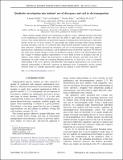Qualitative investigation into students’ use of divergence and curl in electromagnetism
Date
19/10/2016Metadata
Show full item recordAbstract
Many students struggle with the use of mathematics in physics courses. Although typically well trained in rote mathematical calculation, they often lack the ability to apply their acquired skills to physical contexts. Such student difficulties are particularly apparent in undergraduate electrodynamics, which relies heavily on the use of vector calculus. To gain insight into student reasoning when solving problems involving divergence and curl, we conducted eight semistructured individual student interviews. During these interviews, students discussed the divergence and curl of electromagnetic fields using graphical representations, mathematical calculations, and the differential form of Maxwell’s equations. We observed that while many students attempt to clarify the problem by making a sketch of the electromagnetic field, they struggle to interpret graphical representations of vector fields in terms of divergence and curl. In addition, some students confuse the characteristics of field line diagrams and field vector plots. By interpreting our results within the conceptual blending framework, we show how a lack of conceptual understanding of the vector operators and difficulties with graphical representations can account for an improper understanding of Maxwell’s equations in differential form. Consequently, specific learning materials based on a multiple representation approach are required to clarify Maxwell’s equations.
Citation
Bollen , L , van Kampen , P , Baily , C & De Cock , M 2016 , ' Qualitative investigation into students’ use of divergence and curl in electromagnetism ' , Physical Review Physics Education Research , vol. 12 , no. 2 , 020134 . https://doi.org/10.1103/PhysRevPhysEducRes.12.020134
Publication
Physical Review Physics Education Research
Status
Peer reviewed
ISSN
2469-9896Type
Journal article
Collections
Items in the St Andrews Research Repository are protected by copyright, with all rights reserved, unless otherwise indicated.

